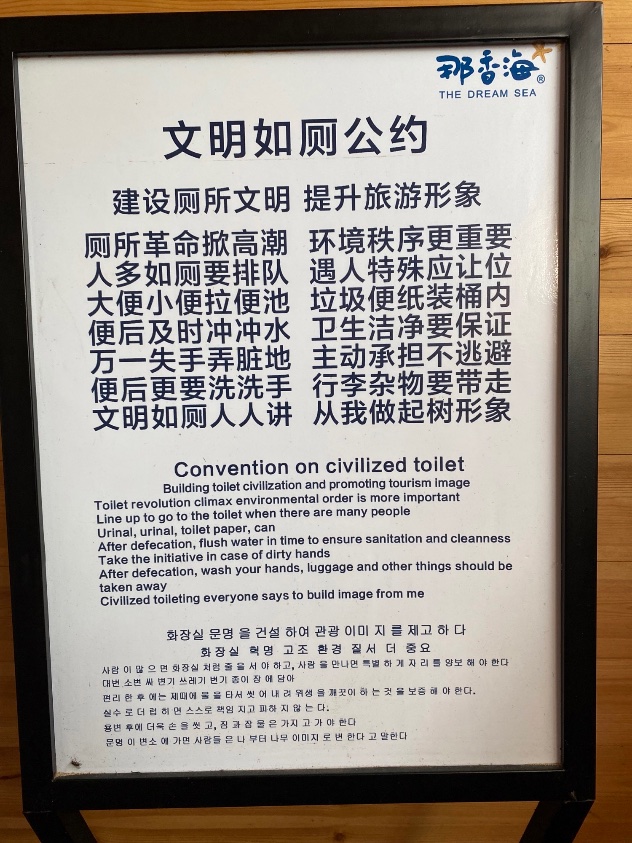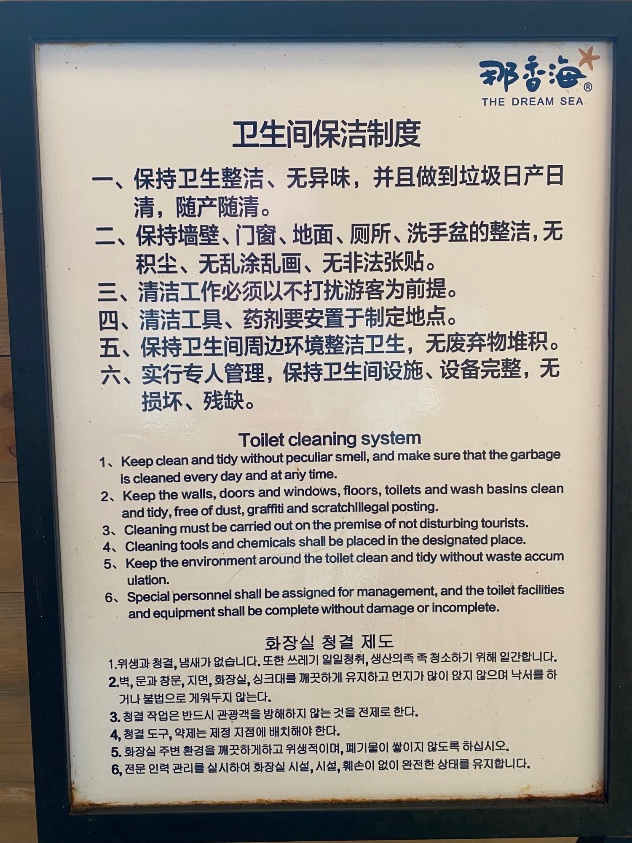Trilingual Shandong beach toilet civilization
« previous post | next post »
Since these signs are rather long and in three languages, I will not apply the customary Language Log treatment of Romanization, transcription, and complete translation, but you should be able to get a good idea of what they are all about nonetheless.
These photographs were kindly sent to me by Francis Miller, a teacher and college counselor who has been long resident in the city of Xi'an and has experienced the infamous lockdowns there firsthand.
I told Francis that it was nice that he could get away from the heat and humidity of Xi'an for a few days, but that the beaches of Qingdao must be extremely crowded (I have personally witnessed them in pre-pandemic days).
Francis replied:
Beaches here are mostly empty, which is amazing, but also somewhat creepy. So few people are traveling this summer because covid policies are changing so quickly and lockdowns have happened so suddenly. Surprise surprise, apparently one wants to be stuck in a lockdown in a random city they are traveling through…
Selected readings (a small sampling of Language Log posts on toilets, urination, etc. in many countries)
- "Toilet Revolution!!" (11/16/17) — comes with an enormous, continuously updated bibliography in the last comment
- "A quantum leap in the Chinese toilet revolution" (5/6/19)
- "M & W WC" (9/12/17)
- "World's worst superhero" (10/17/20) — with extensive bibliography
- "Location Man" (12/31/14)
- "With precision and elegance" (4/7/20)
- "Between pee and bad" (8/15/19)
- "Civilized urinating" (10/31/17)
- "Linguistic advice in the lavatory: speaking Mandarin is a great convenience for everyone" (9/11/07)
- "Just the Queen invites irrigation" (4/8/08)
- "Let's go to the toilet for dinner tonight" (8/8/08)
- "Quadrilingual Washlet Instructions" (8/22/09)
- "I'm lovin' it — next to the toilet" (12/12/09)
- "Japanese hi-tech toilet instructions" (1/19/17)
- "Chinese lesson for today" (8/29/10)
- "Next day's Chinese lesson" (8/31/10)
- "Urination is inhuman" (2/6/11)
- "Pwimming poot" (8/29/11)
- "Signs from Kashgar to Delhi" (10/11/13)
- "Greater and lesser conveniences" (6/25/14)
- "Please pee in the pool" (8/4/14)
- "Kein Durchgang" (5/16/15)
- "Six God toilet water itching" (11/25/15)
- "'Please enter your cock after urinating'" (4/9/16)
- "Toilet: A Love Story" (9/1/18)
- "Bovine / friggin' toilet" (9/6/18)
- "Toilet revolution!, part 2" (11/22/18)
- Arthur Meursault, Party Members (Camphor Press, 2016), ch. 4 (can be read through Amazon's "Look Inside" feature here) — be prepared for a scatological horror story


M. Paul Shore said,
July 13, 2022 @ 3:51 pm
I assume that, in the last sentence, “apparently one” is supposed to read “apparently no one”. (And I gather the photos were taken at a Qingdao beach location, which the post only indirectly indicates.)
Francis said,
July 13, 2022 @ 10:30 pm
@M Paul yes it’s supposed to be no one. Except for me haha. Happy to be locked down with a change of scenery anywhere but Xi’an. As for location, the Naxianghai 那香海 “Dream Sea” is a ways down the coast from Qingdao. It is it’s own kind of touristy attraction in Rongcheng, which is part of the city of Weihai, a different area in northeastern Shandong. It’s also known as the “diamond beach”.
John Swindle said,
July 13, 2022 @ 10:41 pm
Is there a story behind the name Naxianghai 那香海 “The Dream Sea”?
M. Paul Shore said,
July 14, 2022 @ 9:33 am
Francis: Ah, yes, I see on the map where Wēihǎi (Wēihǎiwèi in pre-PRC times) is located, way high up on the Shandong Peninsula—so actually up the coast, not down the coast, from Qingdao. Just up the Wēihǎiwèi highway, as it were.
Jongseong Park said,
July 16, 2022 @ 6:53 am
If anyone is wondering, the Korean "translation" makes about as much sense as the English one. But what catches the eye is the utter confusion regarding spacing in the first photo.
화장실 문명 을 건설 하여 관광 이미 지 를 제고 하 다
RR: Hwajangsil munmyeong eul geonseol hayeo gwangwang imi ji reul jego ha da
Yale: Hwacangsil mwunmyeng ul kensel haye kwankwang imi ci lul ceykwo ha ta
should be, according to South Korean norms on spacing (ignoring the weird word choices),
화장실 문명을 건설하여 관광 이미지를 제고하다
RR: Hwajangsil munmyeong-eul geonseol-hayeo gwangwang imiji-reul jego-hada
Yale: Hwacangsil mwunmyeng-ul kensel-haye kwankwang imici-lul ceykwo-hata
"To elevate tourism image by constructing bathroom civilization"
Separating out particles like -을 -eul, -를 -reul, and forms of the verb 하다 hada may make a certain amount of sense, but then to further insert a space as 하 다 ha da is puzzling, and there is no conceivable reason for the weird spacing of 이미지 imiji—a loanword from English "image"—as 이미 지 imi ji. Later, you also see the monomorphemic noun 자리 jari ("place, spot") written as 자 리 ja ri. The effect is real ly jar ring to read, as if you were in sert ing spaces seem ing ly at random be tween syllables in a sen tence in English.